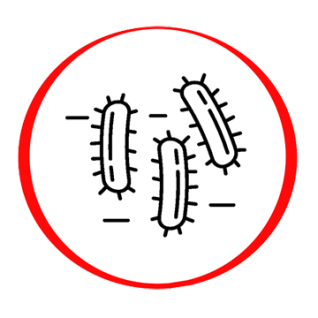Blood take service 4.00€

EBV IgG | Epstein-Barr Virus IgG antibodies
15.00€
Infectious mononucleosis
Infectious mononucleosis is an acute viral infection characterized by fever, sore throat and enlarged lymph nodes. The source of infection is people with acute or chronic infectious mononucleosis, as well as healthy virus carriers. People start spreading the infection a few weeks after being infected.
Disease spread
Epstein-Barr viruses are spread by droplets through the air and by contact. It is possible to become infected through direct contact with a sick person (for example, kissing or using the same cutlery). Viruses spread when the patient talks, sneezes, coughs. Infectious mononucleosis is often contracted by kissing, which is why this disease is also called the kissing disease. Epstein-Barr viruses are widespread throughout the world. About 90-95 percent people in the world are infected with these viruses. A person infected with this disease develops EBV antibodies in the body, which remain for life. Children under the age of 5 are most commonly infected with Epstein-Barr virus, but the viruses usually do not cause any symptoms of the disease or cause signs of a respiratory infection that would not normally be suspected of having infectious mononucleosis. After exposure to viruses, resistance to infectious mononucleosis caused by EBV develops.
Symptoms of the disease
Often, the onset of the disease is manifested by non-specific symptoms: general malaise, great fatigue, lack of appetite, chills, muscle pains. Later, the temperature rises, chills, sore throat and head, "break" bones. The temperature may be high for a few days, then drop and not rise above 38°C. Fever lasts from 2-7 to 20 days. Sparse pink spots may appear on the face, torso and limbs. One of the most common symptoms of the disease is the enlargement of many lymph nodes, especially in the neck, armpits, and rarely in the groin. The throat and tonsils are reddened, grayish or greenish scales appear on the tonsils. There may also be inflammation of the gums and oral mucosa. Fatigue may persist for several months.
In children up to 5 years of age, EBV infection usually does not cause symptoms of the disease, but it can manifest itself with unusual symptoms: irritability, abdominal pain due to an increase in the lymph nodes or spleen surrounding the intestines, signs of an upper respiratory tract infection. Symptoms of infectious mononucleosis rarely last longer than 4 months, if they last longer than 6 months, it is called chronic EBV infection. It is not recommended to do sports or do heavy work for 2 months after the relapse of the disease.
EBV infection is diagnosed based on clinical symptoms and laboratory tests:
Increased :
IgM - acute infection (3-6 weeks after the onset of the disease).
IgG - chronic infection or past exposure (persistent throughout life).
General blood test: leukocytes (of which lymphocytes <50%) monocytes (from 30 to 70%).
Some patients may experience elevated liver enzymes - AST and ALT.
There is no specific treatment. It is treated according to the prevailing symptoms: temperature, pain.

Reference: 17122
15.00€






